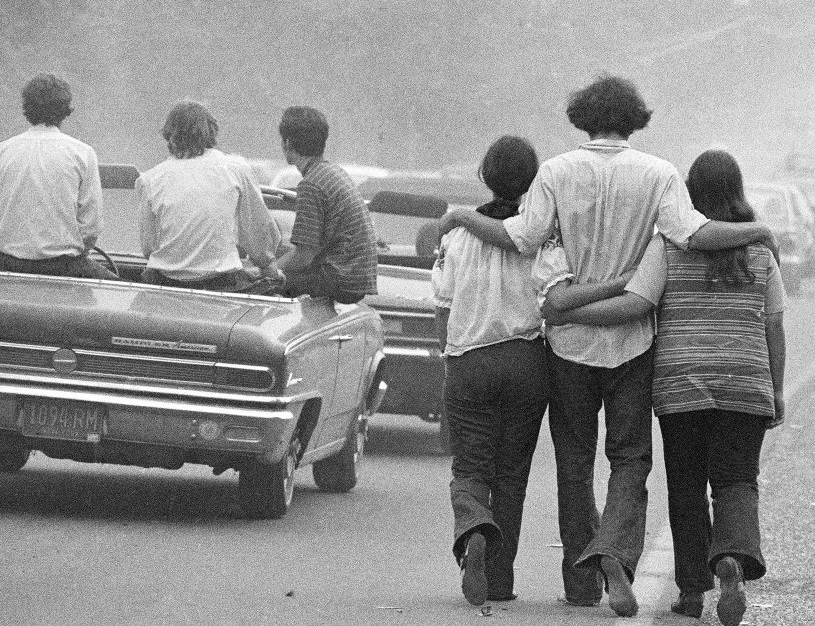Matthews’ Southern Comfort – Woodstock (1970)
Like most 60’s protest songs, the present case study is about the lyrics first – here, a dreamy, spiritual account of the famed music festival.
But the music it’s set to is tertiary. More interesting, by half, are the stories and history surrounding Canadian legend Joni Mitchell‘s anthem. There are several.
For all purposes, there are three authoritative versions of the song that survive with any echo today. And all were released within four months of one another in the year following the event. Many other cover versions followed, but none had the cache of the original, of the Crosby, Stills, Nash and Young follow-up, or of the superior musical interpretation of short-lived bitplayers Matthews’ Southern Comfort. That in itself is a remarkable happening.
Joni never performed at Woodstock. She’d have happily done so, but her manager had already booked her for an appearance on the Dick Cavett Show and felt strongly that the variety-TV gig would offer better exposure and be more impactful to her career. Can you imagine.
Joni rather holed up in her hotel room in NYC watching the news highlights of free, hairy, young people flocking to the event’s rural setting 200 km northward. And in the days following, she got a second-hand account of it all from her beau Graham Nash (of the very same CSN who had just performed on the big stage). On none other than those bases and her uncommon creative faculties, a song was born. She released it as the B-side of her lynchpin single Big Yellow Taxi (in April 1970), and then included it on her upcoming third album Ladies of the Canyon.
With Nash trading on insider information, CSN-and-now-Y wasted no time. They engaged the consult of Jimi Hendrix to craft a hard-ass rock version of the original and include it on their keystone Deja Vu album, released within weeks of Joni’s album. The boy-band version was an A-side, so it got more play than the girl version did. Indeed, theirs remains to this day a workhorse on classic rock stations everywhere.
But the best of this song was going to come in a flashflood from far away. Matthews’ Southern Comfort was not a southern US band, it was a British folk-rock band and it led the ephemeral existence of a tse-tse fly. They formed in 1970. They broke up in 1970. And their most productive year was. ahem. 1970.
[ed. Second Canadian connection in this story: Iain Matthews took the name of his band from the Canadian duo Ian and Sylvia Tyson‘s song Southern Comfort.]
In that year, they would capitalize on any exposure they could, and one such opportunity was a performance on BBC Radio One. They’d prepared three songs. BBC wanted four. So they added a cover, Joni’s new song, and they performed it faithfully to her original rendering for the broadcast.
Then, Matthews himself relates, the song was “taken apart and put back together again” for the purpose of releasing it as a single, which they’d only do in the UK if the CSNY version didn’t make a splash there. And it made no splash there. So out came the Matthews version.
Splash!
It rocketed up BBC’s Tops of the Pops and got traction elsewhere in Europe as well. But the US was going to be a long row to hoe, because, you know, Joni’s boyfriend’s band.
[ed. Canadian connection number three, de suite…]
New regulations to protect Canadian culture from its loud, rude nextdoor neighbour required that, among many other things, a certain percentage of music played on Canadian-licensed radio stations be Canadian content (‘CanCon’). The qualifying criteria were quite squishy, but Joni Mitchell, being Canadian-born (never mind that she’d been living in California for five years by this time), was part of the club. Add to that the fact that Canada’s entire music business was Paul Anka, Bobby Curtola, Lighthouse, The Guess Who and Blood Sweat & Tears, the pickins were slim for filling up nearly half of a broadcast schedule. Iain Matthews’ new single was going to get some spins in The Great White North.
Listeners in US border cities of Canadian stations were going to get charge doses of a new, absolutely brilliant version of a song that was already twice known to them by Canadian recording artists Joni Mitchell and the Y of CSNY. The 5000 km border that has contained a novel coronavirus couldn’t contain a viral song.
Matthews didn’t do anything remarkable with the song, other than just get the hell out of its way. The instrumental intro is simple, colourful and brief; the vocal melody of the verse is smooth and plain; that of the chorus opts out of Joni’s startling octave leap and awkward harmonic cadence and just alights like a butterfly from the lyric’s dream (jeez, I’m going to regret that sentence when these painkillers wear off); and the gentle slide guitar solo avoids the rusty shrieks of Neil Young’s jam in the boyfriend version. It murmurs like Joni, but not too much. And it fills out the tapestry like CSNY, but not too much.
That Matthews’ Southern Comfort barely even existed and left no lasting legacy has hurt their Woodstock. In the half-century since these three versions were released, CSNY has won. AM music radio now long extinct, the lovely masterwork has had no stickiness. That’s a shame.



